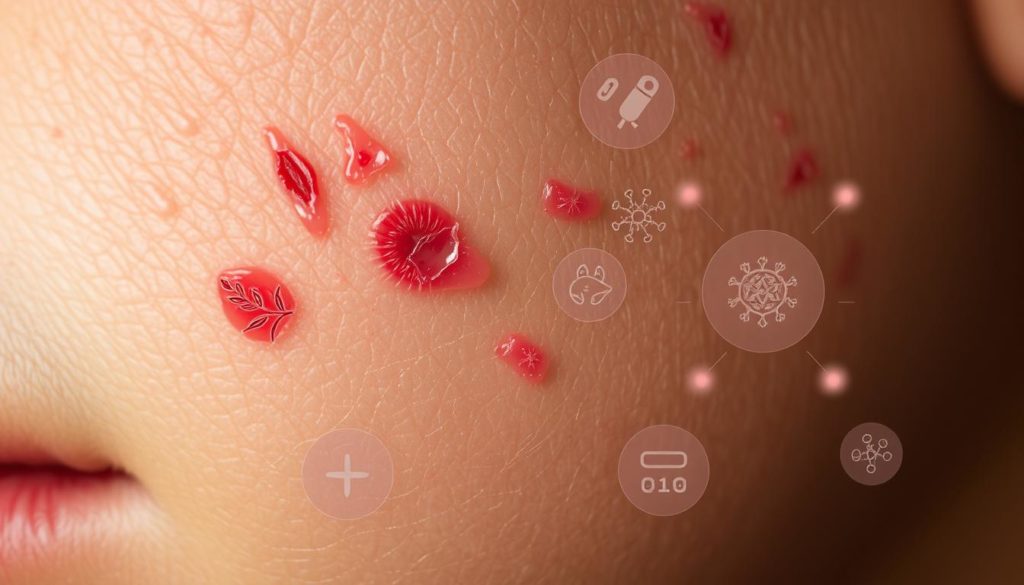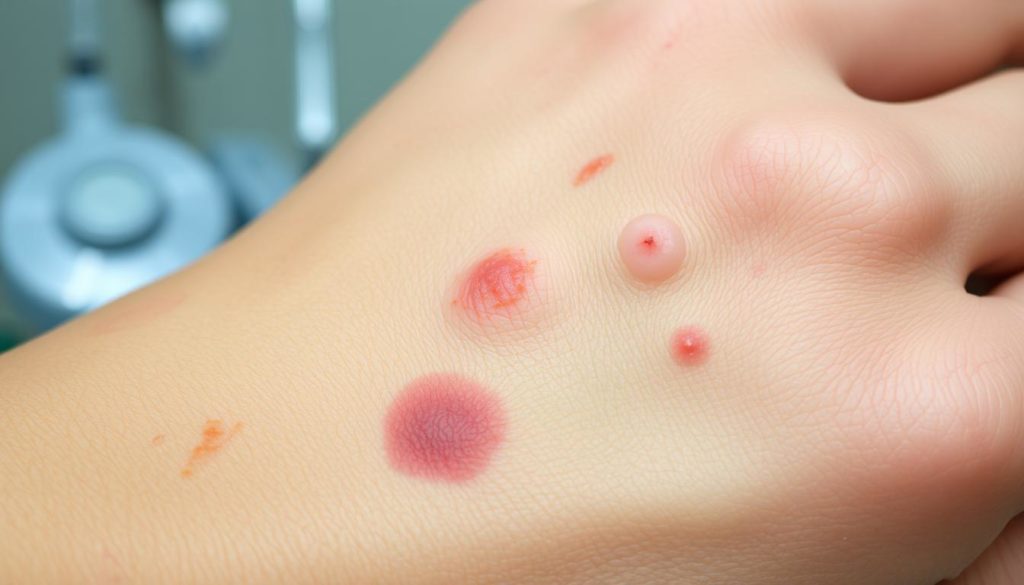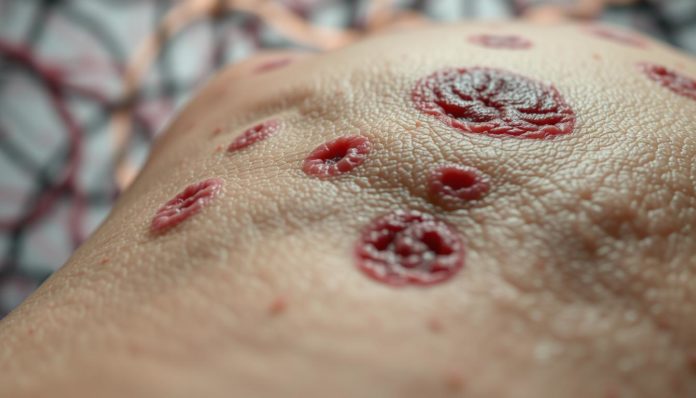Did you know up to 20% of Alzheimer’s patients suffer from severe itchy skin? This sheds light on a side of Alzheimer’s that affects patients’ lives deeply. Exploring how Alzheimer’s and skin irritation are linked is crucial.
We are looking into why skin issues are common in Alzheimer’s patients. Current research and stories show us why this is. We aim to spark more study on easing skin irritation for Alzheimer’s sufferers.
Understanding Itchy Skin in Alzheimer’s Patients
Itchy skin is common, but it’s more complex in Alzheimer’s patients. Knowing what causes itchy skin helps tackle the problem better.

Common Causes of Itchy Skin
Many things can make skin itch, from the environment to health problems. Dry skin, allergies, infections, and some medicines are often to blame. For those with Alzheimer’s, figuring out the cause can be tougher.
How Alzheimer’s Affects Skin Health
Alzheimer’s impacts more than just memory; it also affects physical health. It can worsen skin health by leading to less cleanliness, poor eating, and trouble sharing when something hurts. This can cause more skin problems.
Research and real-life stories show how big this issue is. Alzheimer’s patients might get more skin irritation and sensitivity. That makes it vital to look after their skin carefully.
Signs and Symptoms of Itchy Skin in Alzheimer’s
It’s crucial to understand and notice itchy skin in Alzheimer’s patients for good care. Those with Alzheimer’s might find it hard to say when they’re uncomfortable. So, spotting signs early is very important.

Identifying Itchy Skin Episodes
Alzheimer’s patients might scratch a lot, rub their skin, or show skin damage from scratching. Caregivers might see them being restless, more upset, or finding red or dry spots on their skin. Watching these signs carefully helps figure out itchy skin issues fast. Then, one can start the right treatment straight away.
Symptomatic Overlaps with Other Conditions
Finding out if itchy skin is from Alzheimer’s can be hard because its symptoms look like other conditions. Redness, dryness, and sores might also point to dermatitis, eczema, or allergies. Therefore, doctors must check patients well to know the true cause. Getting help early is key to better managing skin problems in Alzheimer’s patients, making their lives better.
Potential Medical Explanations
The link between Alzheimer’s disease and itchy skin is complex. It involves medical theories that need exploring. Let’s look into the brain and immune system’s roles in this issue.
Neurological Links
Studies on the brain show its pathways might impact itchiness. In Alzheimer’s, these pathways often get disrupted. This leads to the brain and skin not communicating well.
When this happens, patients feel a constant itch needing relief. The loss of neurons affects how the brain handles sensations, including itchiness.
Immunological Factors
Immune system changes play a role in itchy skin for Alzheimer’s patients. These changes might make their skin react more to irritants. As a result, their skin becomes itchier.
Researchers are looking into how the immune system’s alterations could worsen itchiness. They’re also studying treatments to help manage these symptoms.
Research Insights: Itchy Skin and Alzheimer’s
Recent studies have found a link between itchy skin and Alzheimer’s. It’s vital to know how they connect to improve treatments.
Changes in the brain and immune system of Alzheimer’s patients cause skin itchiness. This shows we need to consider both mind and skin health together.
More studies are looking into how common itchy skin is among Alzheimer’s patients. Understanding its effects on life quality is a major goal.
To help these patients, we’re combining skin care with Alzheimer’s treatment. This new approach could lead to better ways to ease their discomfort.
Effective Itchy Skin Treatments for Alzheimer’s Patients
Managing itchy skin for those with Alzheimer’s can be a hard task. But, there are proven treatments out there. Choosing the right treatment is key for comfort and avoiding more skin issues.
Topical Solutions
Topical solutions are usually the first step in treating itchy skin. This includes creams you can buy without a prescription, medicated lotions, and soothing salves. These products are made to help with skin irritation.
Ingredients like hydrocortisone and calamine can ease itching and lower swelling. Also, creams that moisturize with aloe vera or oat extract help. They keep the skin moist and less irritated.
Prescription Treatments
Sometimes, over-the-counter products aren’t enough. In those cases, doctors might recommend prescription options. They might suggest stronger creams or pills that reduce itching for more severe cases.
For patients with Alzheimer’s, certain medicines that target the brain could also help with itchy skin. These treatments focus on the Alzheimer’s-related causes of skin irritation.
Skin Irritation Remedies
Dealing with itchy skin in Alzheimer’s patients is challenging. Yet, natural and home remedies offer effective relief. These methods are gentle and good for sensitive skin.
Natural and Home Remedies
Natural and home remedies can relieve itchy skin. Applying aloe vera gel soothes the affected area. Oatmeal baths comfort and lessen irritation. Plus, coconut oil is great for moisturizing and easing itchiness.
Preventative Measures
Preventing skin irritation is key for Alzheimer’s patients’ skin health. Use hypoallergenic moisturizers to keep skin hydrated. Trim nails regularly and wear soft, breathable clothes to avoid irritation. Eating well, with plenty of vitamins and minerals, also helps.
| Preventative Measure | Benefit |
|---|---|
| Hypoallergenic Moisturizers | Prevents Dryness |
| Soft, Breathable Clothing | Reduces Irritation |
| Balanced Diet | Supports Skin Health |
Managing Skin Health in Alzheimer’s
It’s very important to keep the skin healthy for people with Alzheimer’s. This means doing regular skin care, seeing skin doctors often, and making sure skin care is part of overall Alzheimer’s care. Doing this helps avoid skin problems and makes patients feel better overall.
Keeping the skin care gentle is key. Washing, moisturizing daily, and shielding skin from the sun helps stop skin problems. Here are some good steps for Alzheimer’s patients:
- Using mild soaps and cleansers
- Applying hypoallergenic moisturizers
- Ensuring skin is protected from excessive sun exposure with high SPF sunscreen
- Keeping hydrated to maintain skin elasticity
Seeing a dermatologist regularly is wise for Alzheimer’s patients. They offer tailored advice and skin care changes. By keeping an eye on the skin, many issues can be prevented.
Teaching caregivers how to spot and handle skin problems is part of total Alzheimer’s care. Giving them the right instructions and tools helps them care for skin properly.
“Maintaining healthy skin in Alzheimer’s patients is not just about preventing discomfort but enhancing their quality of life,” says Dr. Melissa Levin, a renowned dermatologist.
Adding skin care to daily routines really helps Alzheimer’s patients stay healthy and comfy. Here’s how routine skin care helps:
| Practice | Benefits | Frequency |
|---|---|---|
| Gentle Cleansing | Removes dirt and prevents irritation | Daily |
| Moisturizing | Maintains skin hydration and softness | Daily |
| Sun Protection | Prevents sunburn and skin damage | As needed when outdoors |
| Staying Hydrated | Promotes skin elasticity and health | Throughout the day |
With these steps, caregivers can help Alzheimer’s patients feel better. It ensures comfort and a better life quality.
Impact on Quality of Life
Alzheimer’s disease makes life tough, especially with symptoms like itchy skin. This problem harms both physical and emotional health. It makes simple daily activities a struggle.
Daily Challenges
Itchy skin is a big problem for those with Alzheimer’s. It ruins their daily lives. They often can’t sleep well, worsening their cognitive issues.
The constant need to scratch can harm the skin, leading to infections and more stress. Dealing with these problems needs careful attention and creative solutions for relief and comfort.
Caregiver Tips
Caregivers are key to helping manage itchy skin, improving life for Alzheimer’s patients. Here’s what they can do:
- Maintain Skin Hydration: Use moisturizers that are gentle and free of fragrance.
- Create a Comfortable Environment: Choose soft, breathable fabrics for clothes and bedding to lessen skin irritation.
- Monitor Skin Condition: Watch for signs of infection or worsening itchy skin. Seek medical advice when necessary.
- Implement a Routine: Have a regular skincare routine to keep itching at bay for those with Alzheimer’s.
Caring effectively means looking at all needs: physical, mental, and emotional. Care plans should be updated regularly to reflect the changing symptoms of Alzheimer’s. This is crucial for better quality of life.
| Challenge | Solution |
|---|---|
| Sleep disturbances | Maintain a consistent nighttime routine and use soothing products. |
| Skin infections | Regular inspections and prompt treatment of skin issues. |
| Agitation | Engage in calming activities like gentle massages or listening to soothing music. |
| Emotional distress | Offer emotional support and maintain social interactions. |
Future Directions in Alzheimer’s and Itchy Skin Research
Looking into the future of Alzheimer’s research shows promise, especially its connection to itchy skin. Developing new treatments that focus on both Alzheimer’s and skin health is key. This can greatly improve how we care for patients.
The way research is growing, adding skin care to Alzheimer’s treatments could be very important. If we learn how Alzheimer’s affects skin health, we might find new ways to help. Scientists are starting to study how Alzheimer’s disease and itchy skin are related.
Future studies should look at:
- The brain processes that cause itchy skin in Alzheimer’s patients.
- The genetic signs that might make a person more likely to have this problem.
- New treatments that help with both the mind and skin issues.
When researchers focus on Alzheimer’s and related skin problems together, we can make big steps forward. This hope could lead to better outcomes for those with Alzheimer’s and their loved ones. The goal is to find discoveries that improve their lives in a big way.
Holistic Approaches to Alleviate Itchy Skin
Holistic health is a way to treat many health issues. It is now being used for skin problems in Alzheimer’s patients. It uses physical, emotional, and environmental steps to help. This approach not only helps with itchy skin but also makes overall health better.
For the physical part, people use natural remedies to ease skin irritation. Essential oils such as lavender and chamomile help because they reduce inflammation and soothe the skin. Eating foods full of antioxidants and omega-3s also helps the skin from the inside.
Feeling good inside your mind is important too. Techniques to reduce stress, like meditation, have a positive effect on skin health. Keeping your mind calm can help control itchy skin. Plus, being in a clean place without allergens can prevent skin problems.
Caregivers using a holistic way are showing deep care. They blend different health methods to help Alzheimer’s patients. This care improves symptoms and makes life better for them.
FAQ
Can Alzheimer’s disease cause itchy skin?
Yes, research and stories show Alzheimer’s can hurt skin health. It often leads to more itchiness and sensitive skin.
What are common causes of itchy skin in Alzheimer’s patients?
Dry skin, allergies, medication side effects, and poor personal care are common causes. Alzheimer’s worsens these skin issues.
How can I identify an itchy skin episode in someone with Alzheimer’s?
Look for lots of scratching, red, irritated skin. These signs help spot an itchy skin episode.
Why does Alzheimer’s affect skin health?
Alzheimer’s impacts skin due to less self-care, immune changes, and medicine side effects. The brain’s decline also affects skin health.
What are the symptomatic overlaps between itchy skin and other conditions?
Itchy skin in Alzheimer’s can seem like eczema, psoriasis, or allergies. This makes it hard to diagnose and treat.
What are some medical explanations for itchy skin in Alzheimer’s patients?
Studies say changes in the brain and immune system might cause itchy skin. The aging nervous system plays a role too.
What are some effective itchy skin treatments for Alzheimer’s patients?
Treatment options include creams, lotions, and prescriptions. Always talk to a doctor for the best treatment plan.
Are there natural or home remedies for itchy skin in Alzheimer’s patients?
Dietary changes and natural products can help. Using humidifiers and drinking enough water are also good.
How can caregivers help manage itchy skin in Alzheimer’s patients?
Caregivers should encourage regular skin care and proper hydration. It’s important to act fast on any skin changes.
What impact does itchy skin have on the quality of life for Alzheimer’s patients?
It causes discomfort, anxiety, and sleep problems. Better skin care improves life quality for those with Alzheimer’s.
What future research directions are expected for itchy skin and Alzheimer’s?
Future studies will look more into itchy skin and Alzheimer’s. The goal is to find new treatments and improve patient care.
How can holistic approaches help alleviate itchy skin in Alzheimer’s patients?
Holistic methods offer full care. They focus on diet, stress relief, and using natural skin products.


